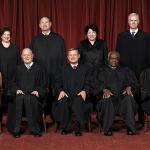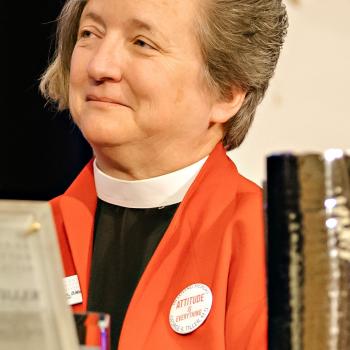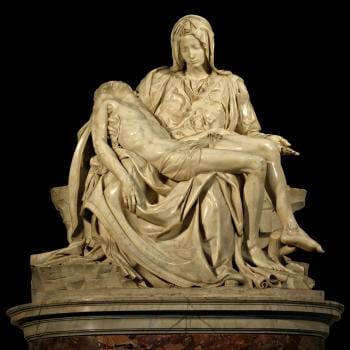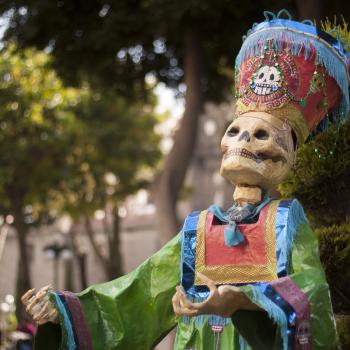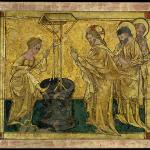There is an interesting angle to the Supreme Court’s decision in favor of the Colorado baker who declined to provide a wedding cake for the wedding of a same sex couple.
I believe he made the same case that was brought out in a similar story of the florist who declined to provide flowers for a same sex wedding. Baronelle Suzman’s case has also been appealed to the Supreme Court.
She claims that declining to provide flowers for a same sex wedding was not because of homophobia or anti-gay discrimination, but because it was specifically for a wedding. In other words, she’d provide flowers for gay people if they were having a nice dinner, 0r for a birthday celebration or for any other event–but not a wedding. The baker also said he’s provide any kind of baked goods for anybody–including gay people for any other event, but not for a wedding.
Did the Supreme Court justices recognize this distinction? I’m not sure they did. This article at First Things dissects the decision accurately. The judges were mostly concerned with the hostility of the Colorado’s board toward the Mr Phillip’s religion. They did not address the real issue, and did not take any notice of the distinction between being opposed to a gay wedding and being hostile to gays.
But let’s push this distinction because it is important, and the issue is clouded further because the Protestants who resist gay weddings do not have a completely clear explanation of why they do because they do not have a clear and historic understanding of marriage as a sacrament.
To understand the distinction we have to first explain what a wedding is for Catholics. Non-Christians may have a whole range of views about what a wedding is. They might view it as a romantic event in which two people who love each other promise to do so for the rest of their lives. That’s fine and good and Catholics believe that, but we believe it is more than that.
They might believe that it is a beautiful ceremony celebrating life and love and a wonderful future together forever. That’s good and beautiful, and Catholics believe that, but we believe it is more than that.
They might believe it is a fabulous celebration of family and friends coming together in a glamorous and beautiful location to affirm all that is beautiful and loving. That’s good. Catholics believe that, but we believe it is more than that.
They might believe it is a religious event in which the two people are joined not just romantically and physically and socially, but spiritually too. That is also good and Catholics believe that too, but we believe it is more than that.
We believe that a marriage between a man and a woman was created by God at the very beginning so that they might love another and share in God’s creation of new life through the physical union of their bodies. We also believe that the union between one man and one woman confirms the complementarity of the sexes as created by God and that nothing can replicate that unique union of male and female. Furthermore, we believe that union is a God-given revelation of Christ’s love for his church, and God’s love for his people. Finally, we believe that marriage is a sacrament–that it is a physical means of God giving his grace. It is sacred. It is our ladder to heaven, and we believe that we cannot change this definition of marriage even if we wanted to. We can’t change this definition of marriage any more than we can use Coca Cola and potato chips for Holy Communion or baptize someone in chocolate milk.
For a Catholic every wedding therefore carries much more meaning and purpose than a marriage where these beliefs do not exist.
Now here’s where it gets sticky. Because we believe all these things about marriage we also affirm that a wedding ceremony is a public, formal statement of one’s beliefs about marriage. In other words, whether anyone likes it or not, for a Catholic, a wedding is a statement of faith (or no faith as the case may be). Furthermore, every guest at a wedding is technically a witness to that wedding, and if a witness then someone who affirms the statement of faith that is being made.
When you go to a gay wedding therefore, you are not only affirming gay sex. You are also affirming their belief about marriage (which contradicts the Catholic beliefs about marriage) and therefore openly, publicly and formally denying your Catholic faith.
Therefore, a Catholic could not possibly attend a same sex wedding. That doesn’t mean that one has to be nasty about it. One can be civil and wish the homosexuals happiness and send them best wishes, but explain why you can’t attend the wedding. People decline invitations to weddings all the time, and once one’s beliefs are explained, any tolerant person will agree to disagree, and if they have any kind of humanity, and if they love you, they will respect you for holding to your beliefs in a tolerant manner.
But could the Catholic provide a cake or flowers for the wedding?
I think so, and this is where the clarity in Catholic thinking is a help. A Catholic could provide flowers and a cake because they needn’t go to the wedding itself. One could argue that the customers are just like any other customers: people who eat cake and like flowers. If they want to use the cake and flowers for their wedding–that’s their business.
“Uhhh…hang on!” I hear you saying. “Isn’t that still support for a gay wedding?” Yes, it could be if you decorate the cake with a rainbow flag, two guys on top kissing and a slogan saying, “Hooray We’re Gay We’re Here to Stay” or if you arranged the flowers in a rainbow arc in rainbow colors with the words, “Pope Francis Says Gay is OK!”
But to sell a cake off the shelf, or to set up flower arrangements that are just flower arrangements….I’d say that’s not supporting gay sex anymore than providing a cake for a Hindu wedding means you worship the elephant god Ganesh. It is possible to wish people well even if you disagree whole heartedly with their moral choices.
This is where, it seems to me, the Supreme Court could have used a good canon lawyer or Catholic moral theologian…
Image Creative Commons via Bing


